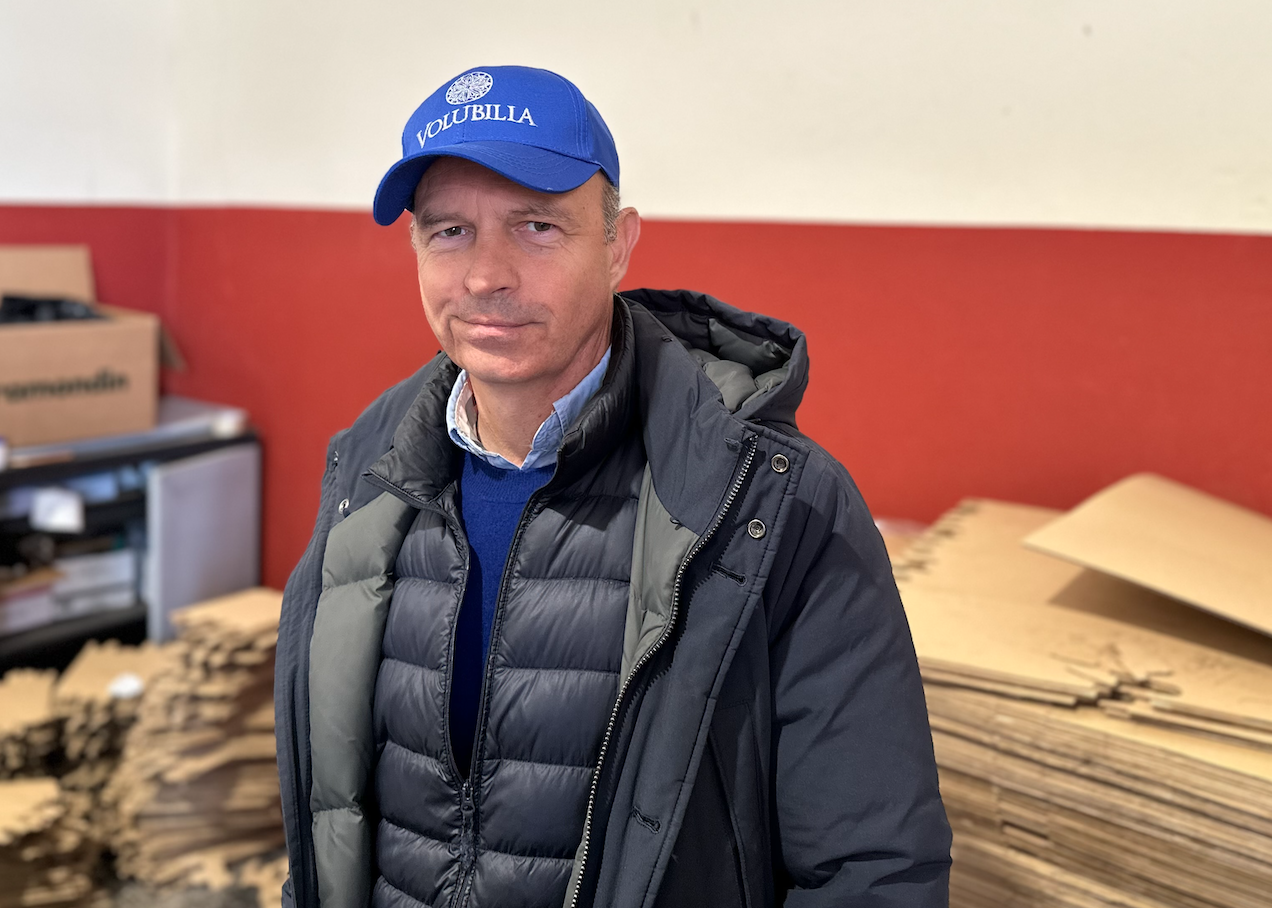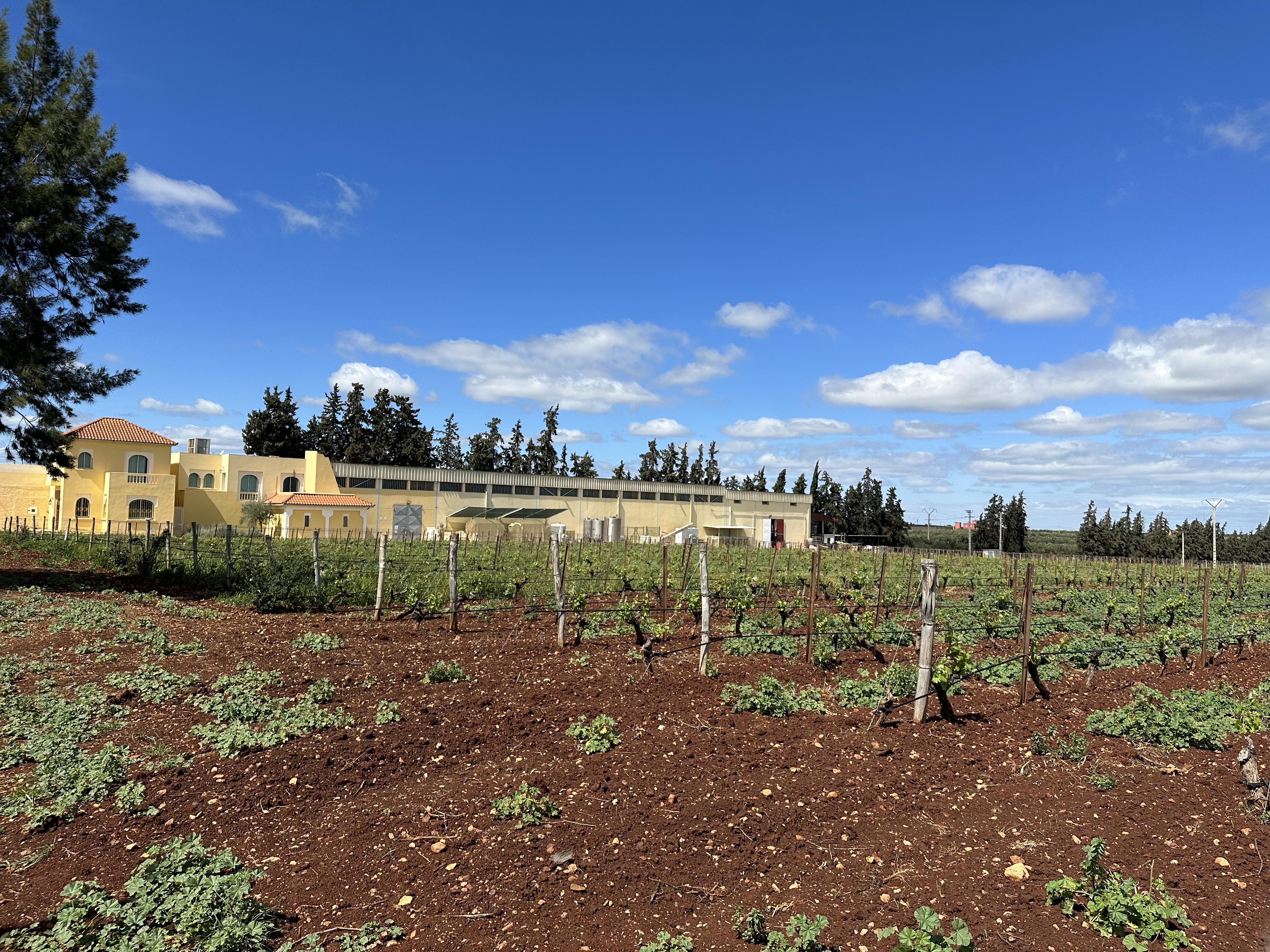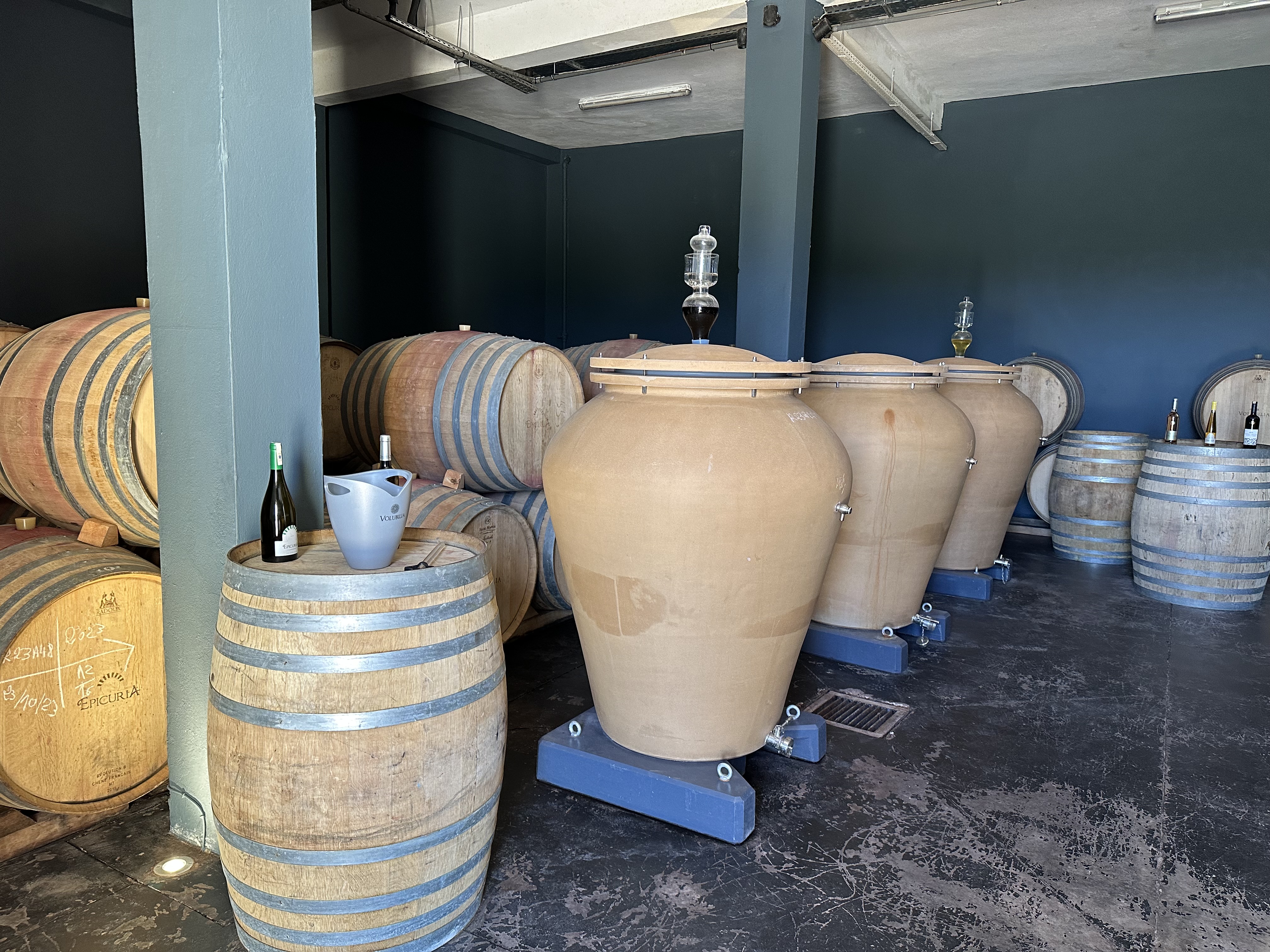Nestled on the outskirts of the Imperial City of Meknès, Morocco, Villa Volubilia is a wine estate that stands as a testament to the country’s growing reputation in the world of wines. Named after the nearby ancient Roman city of Volubilis, the estate blends a rich historical backdrop with modern viticultural practices to craft wines that are uniquely Moroccan.
Winemaking in Morocco has a history that dates back to ancient times, beginning with the Phoenicians and the Romans, who cultivated vineyards near the city of Volubilis, a testament to the region’s winemaking heritage. The introduction of Islam in the 7th century, which prohibits alcohol consumption, slowed the development of viticulture, but vineyards persisted for the production of raisins and grape juice. The modern revival of Moroccan winemaking began under French colonial rule in the early 20th century, when French vintners planted extensive vineyards to supply wine for export to Europe. By the 1950s, Morocco had become a large exporter of wine. Following independence in 1956, the industry faced decline due to reduced European demand and a shift in local agricultural priorities. However, in recent decades, winemaking has experienced a renaissance, fueled by investments from both local and international producers who recognized the potential of Morocco’s diverse terroir, Mediterranean climate, and high-altitude vineyards.
Villa Volubilia owner and winemaker Christophe Gribelin shares insights into the challenges and rewards of winemaking in Morocco, a land of striking contrasts where the Mediterranean climate and mineral-rich soils create ideal conditions for vineyards to thrive.
Christopher Barnes: Talk a little bit about the history of the estate here and how you ended up in Morocco, making wine.
 Christophe Gribelin: Villa Volubilia was established 20 years ago by two French families who decided to invest in Morocco, from Bordeaux and also from Aix en Provence. This is the way we started. We planted vines from Bordeaux, but not only from Bordeaux, and we decided to make good wine in Morocco.
Christophe Gribelin: Villa Volubilia was established 20 years ago by two French families who decided to invest in Morocco, from Bordeaux and also from Aix en Provence. This is the way we started. We planted vines from Bordeaux, but not only from Bordeaux, and we decided to make good wine in Morocco.
(Christophe Gribelin)
Talk a little bit about the area here, Meknès, where are you are located in Morocco?
So we are in Morocco, in North Africa. We are really on the west coast of the Atlantic on the northern part. Morocco is quite a big country with 5000km of coastline. We are in the north part of Morocco in the city of Meknès in between Rabat and Fez. This is an imperial city. Well, we are well in the south of Meknès and not too far away from Volubilis, which is a Roman site, which is very interesting to know because the Romans, as you know, used to make olive oil and wine at that time.
So there is a good tradition in this Imperial City, near the Volubilis site in the northern part of Morocco. And we are in the beginning of the middle Atlas, which confer altitude effects on the vineyards. So we are 800 meters above the sea.
Let's talk a little bit about the terroir in Morocco as a whole, from a wine perspective. And then more specifically, in Meknès.
If we talk about Morocco and the vineyards and the terroir, you have specific terroir in Morocco. And, it's pretty vast, I must say, because, if you go east, to the border of Algeria, you will find the Berkane area. In the middle where we are, in Meknès, it's also let's say the biggest area where you will find vineyards. Also near Casablanca, you have some vineyards. In a lot of parts of the country there are vineyards and even in the south near Marrakesh you find them. So, different areas, different terroirs and different appellations.
If we talk especially about the Meknès area, which is one of the biggest areas where we produce wine in vineyards like the Villa Volubilia, the soils will be clay, limestone. If I mention the terroir, the climate in the winter here you have some low temperatures, we have a very short spring, and then the weather in the summer is pretty hot and dry. So really two seasons with very extreme temperatures.
Talk a little bit about the history of winemaking in Morocco, you know, from the historical perspective.
 So if we talk about history, about the vineyards, the wine in Morocco, we can maybe start with Volubilis which is a Roman archeological site, and we can go to visit this site today. And the estate that I'm running is Villa Volubilia, which refers to Volubilis. They used to do olive oil and wine, the first period that we can find traces of wine made in Morocco.
So if we talk about history, about the vineyards, the wine in Morocco, we can maybe start with Volubilis which is a Roman archeological site, and we can go to visit this site today. And the estate that I'm running is Villa Volubilia, which refers to Volubilis. They used to do olive oil and wine, the first period that we can find traces of wine made in Morocco.
And after that, there is a lot of history with Berbers maybe even some Arabic people that are still doing some wine, until last century with the French, colonials, bringing new expertise, new plantations, from the southeast of France and bringing the wine, vineyards and knowledge from France in order to make wine which was then sent to Europe to be blended with European wine.
And after the ‘90s wine was reborn. In the beginning of the ‘90s particularly there were new investors, new companies that would bring down the knowledge and start to export wine again. And today we have about 10 producers in Morocco, not too many for sure. I think it's very attractive here today if you see the vineyards and taste the wine.
Can you elaborate on the Berber connection with wine?
If we talk about the Berber parallel with wine, we can talk about the fact that, first of all, there were the indigenous people of that time and they lived in the mountains. So, people settling in the mountains in Morocco and, let's say, trade also with the Romans and they will suddenly learn about wine from the Romans and they will continue after the Romans with not only wine but olive oil and other agricultural products. But it was not an industry, it was mostly making wine for home consumption.
And what happened between the Romans and the French protectorate?
If we talk about the first French period of the last century, they brought agricultural practices and of course, they also decided to plant vines at that time. And they brought with them the winemaking process. It was a big industry because they were able to sell the wine to France and mix it with French wine. And also they sold the wine in Morocco.
This is really the first rebirth of wine, with this French period. And the second rebirth was in the ‘90s, with big companies that were integrated with the international wine market that we've been planting vines and restarting with new varieties from France mainly. But it was really two rebirths if we can call it that way.
Talk about what happened to the wine industry after the French protectorate ended in 1956.
What is interesting is that after the French period, and the independence, of course, the agricultural and the wine industry changed, because first of all, they had an issue with the European market. The European market stopped importing wine from Morocco and also from Algeria. They decided to stop because it was not possible to blend their wine and still have legal labels (related to appellation regulations). So, they continued to do wine, but the market wasn’t really there so the vineyards stopped being worked properly. They tried to do something else with the land but it was not attractive as wine production.
And the wine that was being made, as far as quality, was not good as it should be. And that's why the king, Hassan II, decided to push for this industry and to do something different with new players. These new players are still here today. You have the Zibner family and you have French companies, such as Castel and us, even though we are a small player.
How big is the wine industry now compared to under the French protectorate?
If you take the figures of today and compare them to the French period, the production in Morocco then was maybe 10 times what it is today. Today it is still 40 million bottles a year, but in the ‘60s before the European market stopped imports from countries like Morocco, Algeria, and Tunisia, it was 10 times bigger than it is today.
And talk a little bit about the grapes that you use today. Is it correct that there are no indigenous grape varieties being worked with here?
 Usually when you talk about Morocco, we also talk about climate change. And the Romans had at that time their own indigenous varieties, to my knowledge, there is not much information about it.
Usually when you talk about Morocco, we also talk about climate change. And the Romans had at that time their own indigenous varieties, to my knowledge, there is not much information about it.
The ideal would be to work with indigenous varieties, but we don’t have them. So we have to be adaptable and we have to bring new varieties. So far, we bring varieties that we knew at that time from Bordeaux, from the southeast of France, or even from Spain such as Tempranillo, that adapt to this terroir. But today, the climate is moving. We need to also find grapes or varieties that will adapt again. We are 800 meters above sea level. But, it's still something that could be an issue.
We need to adapt with the varieties. So not only for the red, but also for the whites. For example, if I take Chardonnay, Chardonnay is doing well in terms of adaptation to the climate. I'm talking about Villa Volubilia here, which is doing well.
What are some of the grapes that you are most excited about in Morocco? What grapes do you feel really express the terroir here?
If I talk about us at Villa Volubilia there are two varieties that we love, Chardonnay and Syrah. Syrah is also something really interesting because you can do some rosé, some good red. You have a lot of palates to work with Syrah and it is very interesting for a winemaker. And Chardonnay is also really interesting because you can find it in Champagne, in Burgundy, but in Morocco, it's also working. So, this is a good variety for us because the adaptation of this is very impressive for us.
Talk a little bit about your philosophy of winemaking and viticulture.
We try to work in the best way with agriculture, we have organic fields and we also use cover crops to protect against the humidity. So we are really reasonable in terms of what we do. We don't use pesticides, and we try to be more and more respectful with nature. And, this is something very important for us to talk about. There are still a lot of things to test, it’s a work in progress, but this is the philosophy.
Talk a little bit about Morocco as a culture. You have this fabulous architecture in Meknès, Fez and Marrakesh and this wonderful cuisine. How does wine fit into that now?
 To me with wine, the best way to consume it is to pair it with food. And what is great in Morocco is that the wine with the food is fantastic. So when you eat a tagine with couscous in an environment where you have the sun, and when you have the water, you have the freshness and a lot of aroma. It's really interesting to pair the wine with all this rich flavor. This is something that if you go and visit Villa Volubilia you'll be able to taste some lunch with wine pairing, with, let's say Moroccan cooking, and from the terroir.
To me with wine, the best way to consume it is to pair it with food. And what is great in Morocco is that the wine with the food is fantastic. So when you eat a tagine with couscous in an environment where you have the sun, and when you have the water, you have the freshness and a lot of aroma. It's really interesting to pair the wine with all this rich flavor. This is something that if you go and visit Villa Volubilia you'll be able to taste some lunch with wine pairing, with, let's say Moroccan cooking, and from the terroir.
And, if you want to talk about the architecture there are a lot of things to share in Morocco because in Morocco, we have Imperial Cities, where you have a lot of vestiges of the culture. The landscape is beautiful. So, everything is a good inspiration for us, the cooking, the architecture, the Imperial City, the Roman archeological sites, so it is all mixed together.
Talk a little bit about what it's like to be making wine in a predominantly Muslim country.
It's a tricky question. Usually when you talk about Muslims and alcohol and the way we can work with that together, you know Morocco is a pretty open-minded country. Also there's a lot of tourism. I'm going to say that there are also some Moroccan people who will drink some of our wine, for sure. But, the main idea is this is a pretty open-minded country. And I'm going to say that even here we are doing some kosher wine, at Villa Volubilia. You know there is some Jewish tradition in Morocco, because for many years there were Jewish people coming from Spain and going to Fez. So it's possible to have a good wine with tradition in Morocco and also be a part of the country's culture.
What I want to say is that we can make good wine in this country, and this is not an issue, because there is the tradition of that. And for sure, I would like to sell more to tourists. Maybe bring more into the export market. But so far, we have a lot of tourists here, so it's really attractive. I think that with a lot of people that we meet here, I mean, American citizens who visit, they appreciate the local wine here.
I think also there's sort of a tradition of tolerance for other cultures in Morocco. Is that correct?
You're right. If, if you take, Morocco, Morocco is a Muslim country, but tolerance is really part of this country. You have a strong Jewish tradition here with the cooking, with the people. And tourists are welcome in Morocco.
What are your hopes for the future of wine in Morocco? Where would you like to see it in 10 years time? How would you like to see the evolution of wine in Morocco?
Today, Moroccan wine is already the future of European wine. So, I mean, the techniques, the climate, the issues that we are facing are something that, certainly in Spain, that they will face or in France as well. So the climate issues we have here now they will face them in 20 years time.
So difficult to say what the future will be for us in 10, 20 years. Maybe it will be dominated by fighting water issues and climate change. But to me, attitude should be a key focus to think about. That's why we are already at 800 meters altitude and maybe will go higher.














